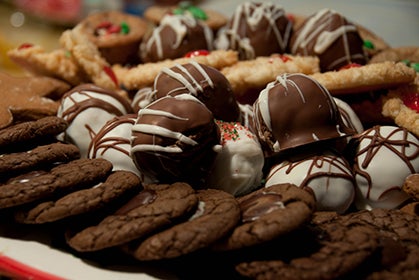Eat, Drink and Run Merry

For many of us, the holidays are a highly anticipated chance to see family and indulge in sweets and cocktails. At the same time, for weight- and performance-conscious runners, they can be a minefield of inflammation, dehydration and poor sleep—not to mention extra pounds.
“I don’t have a[n exact stat], but most runners I have worked with tend to gain an extra five pounds during the holiday season,” says Lindsey Tucker, a registered and licensed dietitian based in Minneapolis, Minnesota. “In Minnesota it may be higher, as we aren’t apt to run as much when it’s bitterly cold. Plus, we love beer.”
But Tucker, a former collegiate runner who in 2012 ran The North Face Endurance Challenge 50K in San Francisco, says that while the extra pounds can be lost, the bigger concern lies with the effects that poor holiday nutrition can have on our recovery and sleep—and, consequently, our running.
“Excessive intake of refined sugar or simple carbohydrates—think Grandma’s sugar cookies—can increase inflammatory processes within the body,” she says. “After a long run or workout, your body is naturally in an inflamed state. Couple that with inflammatory foods and you are looking at a not-so-hot recovery environment.”
And that’s not all: food- and drink-induced sleep deprivation and dehydration can add to your recovery woes, creating a self-compounding recovery deficit.
“Too much rich food, sweet food or overeating in general can lead to restless sleep, which never results in a great run or a strong workout,” Tucker says. “Alcohol can also negatively impact sleep and cause dehydration. Runners who live in colder climates are at even higher risk for dehydration, as average water intake significantly decreases during the winter months.”
Of course, even runners need to cut loose once in a while. Read on for 5 tips on how to enjoy the holiday season—without setting back your training and fitness goals.
1. Hydrate, hydrate, hydrate. Enjoy a few cocktails or beers, and then hydrate some more. Tucker suggests that runners or other athletes set an alarm for the middle of the night after an evening out. When the alarm goes off, wake up and drink some water, then go back to sleep—it can do wonders for you the next morning.
2. Don’t use a long run as an excuse to eat and drink everything in sight. It isn’t a great idea to bank or “save up” your day’s calories for one large, festive meal, especially if you are in a high mileage week or are actively training. This can lead to under-fueling for a workout or long run and inadequate fueling for recovery following a run. You may also be more inclined to overeat, which can lead to restless sleep and GI issues.
In addition, when our bodies are in need of fuel, we often seek sources of quick energy or simple carbohydrates—like Grandma’s aforementioned sugar cookies. Bottom line: fuel before and after your run with your normal pre- and post-run foods, then save the holiday stuff for when you aren’t in a ravenous post-run state.
3. Listen to your body. If you are tired, sleep. If you are hungry, eat. If you don’t feel like running or can tell you overindulged, don’t run.
4. Take some time to unwind. Stress and anxiety can play a role in our food choices, alcohol intake and sleep patterns. If the family is driving you nuts, go for a run, take a nap or just get away for a while.
5. Don’t deprive yourself. Do your best to avoid daily overeating and walking around half in the bag from Thanksgiving to New Year’s, but don’t forget that the holidays are a time for celebration and indulgence. It’s OK to cut loose from time to time!
You might also like: